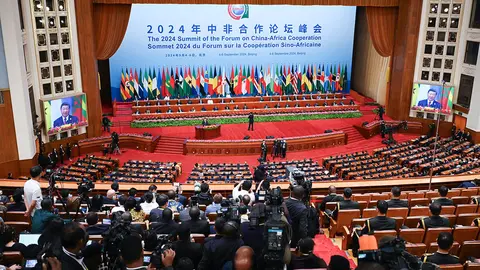The Welfare State and the Role of the Private Sector: Maslow's Paradox

This gap, which seems to be widening despite governmental efforts, poses a real challenge.
The paradox lies in the fact that as the middle class expands, incomes rise, and freedoms increase, expectations continue to grow. Maslow's hierarchy of needs illustrates this phenomenon well: by satisfying basic needs, other, more complex needs emerge.
For example, in Morocco, the GDP has doubled in two decades, allowing a large number of Moroccans to rise out of poverty and join the middle class. These individuals, who were previously concerned mainly with subsistence, now aspire to more: leisure, services, travel, education, and mobility.
However, access to the middle class, especially in its more precarious segments, often leads to frustration. Thus, even if social spending increases, popular discontent follows the same curve, as each rise in Maslow's hierarchy generates new ambitions. This does not mean reducing investment in social programs but rather stimulating the economy to offer households more opportunities to diversify their sources of income.
A welfare state cannot function without a free, dynamic economy that creates jobs and wealth. Contrary to the views of those who advocate for increased state intervention, the real welfare state is built on a delicate balance between public investment and a free economy capable of generating complementary opportunities.
The government, parliament, and the state must, through the finance law, find this balance between mobilizing tax resources and supporting private initiative. The current approach in Morocco, as reflected in recent finance laws, favors reducing the tax burden on small and medium-sized enterprises while taxing large companies more heavily. The collected funds are then invested in social programs. This strategy is justified, as SMEs have proven more effective in creating wealth and jobs, as highlighted in a recent World Bank report.
However, this approach has its limitations. The sustainability of social protection spending and the ability to mobilize tax resources on a regular basis remain major challenges. It would also be wise to turn some of the large companies' surpluses into national investments, especially in disadvantaged regions, where these investments could create jobs and wealth.
Citizens' expectations will continue to grow as long as a real balance between state intervention and private sector contribution has not been found. This balance is essential to create the maximum number of opportunities and respond effectively to the growing needs of the population.
It is therefore crucial to strengthen the tools available to the government and the private sector to meet citizens' expectations. For example, in Morocco, the finance law, the intervention of Bank Al-Maghrib to control inflation, and private sector initiatives are essential mechanisms but still insufficient. The capital market, in particular, has not yet played its role of diversified and adapted financing to the needs of all sectors. Financial products also lack the flexibility and efficiency seen in other economies.
Funding for startups, for example, remains difficult due to the predominance of a traditional financial and investment culture. Even the finance law, the primary tool for responding to citizens' expectations, offers little room for maneuver due to high fixed expenses, which cannot be reduced without jeopardizing crucial balances within the state.
Finally, opening up the labor market, strengthening institutional capital, and stimulating private investments are essential. Morocco's integration into Arab, African, and European economic environments can also generate an additional three points of growth, with a direct impact on employment and wealth.
International experiences show that a welfare state cannot meet all expectations without a strong and engaged private sector. In Morocco, the private sector still depends largely on the state, which has led to an increasing role of public investment, estimated at $34 billion under Aziz Akhannouch's government. However, the contribution of the private sector remains limited. Initiatives such as the creation of the Mohammed VI Investment Fund, the adoption of the new Investment Code, and the reform of the Regional Investment Centers (CRI) represent key opportunities to attract and mobilize private capital, while promoting the country's economic development.



